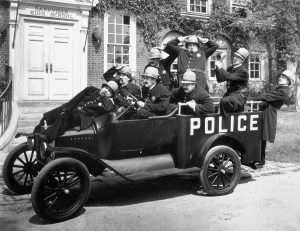 I’ve been reading Great Expectations by Charles Dickens. This book originally appeared in serial form in 1860, and in book form in 1861. Yet this morning, I came across an observation as trenchant and penetrating in today as it was the day Dickens published it a century and a half ago.
I’ve been reading Great Expectations by Charles Dickens. This book originally appeared in serial form in 1860, and in book form in 1861. Yet this morning, I came across an observation as trenchant and penetrating in today as it was the day Dickens published it a century and a half ago.
In it, the main character and narrator, Pip, an apprentice bound to his uncle Joe, returns home late one evening to find that his abusive, borderline personality disordered sister has been badly injured by an attacker.
Pip observes and comments upon the ensuing criminal investigation:
“The Constables, and the Bow Street men from London — for this happened in the days of the extinct red waistcoated police — were about the house for a week or two, and did pretty much what I have heard and read of like authorities doing in other cases. They took up several obviously wrong people, and they ran their heads very hard against wrong ideas, and persisted in trying to fit the circumstances to the ideas, instead of trying to extract ideas from the circumstances … It was characteristic of the police people that they had all more or less suspected poor Joe (though he never knew it) …”
There can be no doubt that police today are infinitely more competent, diligent, honest, and effective than these early lawmen lampooned by Dickens. There can also be no doubt that in the great majority of cases, police and prosecutors are motivated by nothing more than the sincere desire to get the right man – and that, in the great bulk of cases, they do get the right man.
But the sad fact remains – and, given the nature of poor, flawed, fallen man, likely always will remain – that some innocent men are accused. And tragically, some of these wrongly accused, are convicted.
It is my firm belief that, in those few tragic cases when the innocent are falsely accused and convicted, the cause of the injustice can be traced back to the same cause that Dickens cast light upon more than 150 years ago: The police who made the cases against these people, and the prosecutors who brought the charges, “persisted in trying to fit the circumstances to the ideas, instead of trying to extract ideas from the circumstances”, as Dickens observed so long ago.
There are many ideas out there as to how to avoid wrongful convictions – one of which being training police on how to more effectively interrogate suspects, so as to elicit truthful statements rather than mere to extract confessions. But most of all, Dickens’ clever observations bring to mind another important idea: That in this country, the accused is presumed innocent, until proven guilty, no matter how strongly we might suspect otherwise; that the prosecution must be forced to prove each and every element of every charge brought, in order to secure a conviction thereon; and that each and every procedural and substantive Constitutional right must be scrupulously honored throughout the investigation and trial.
I suspect that many people misunderstand, in a fundamental way, just exactly why we follow these constraints. We don’t do so, as some seem to believe, out of any sense of fair play or solicitude toward guilty men: we do them “lest while [we] gather up the tares, [we] also uproot the wheat with them.” We do these things for the same reasons that we prosecute criminals: We do them to protect the innocent.